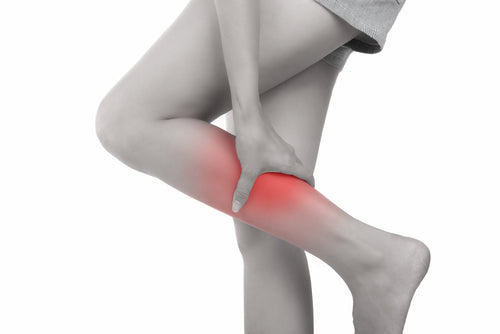Can Wearing Compression Socks Be Harmful? We’re Here to Set the Record Straight
If you’ve considered trying compression wear, then you probably already know a little something about their benefits. Advocates say that graduated compression therapy can provide relief from swelling, pain and venous disorders in the legs and feet, all without drugs or expensive medical procedures — but skeptics may ask, are compression socks good for you?

How Does Compression Therapy Work?
Generally speaking, compression therapy does work and is recommended by the American Venous Forum to treat the signs and symptoms associated with venous diseases. When you experience poor circulation in your veins, your body doesn't get the needed oxygen and nutrients. This can lead to pain, swelling, and numbness throughout your body. Wearing graduated compression garments applies pressure of varying degrees to the legs, offering support to the veins, which in turn, helps increase venous blood flow.
However, not every person with leg or foot pain should immediately go out and buy a dozen pairs of compression stockings. Here’s some more information to help you decide if you can benefit from compression therapy.
Am I a Good Candidate?
People who deal with a wide range of venous conditions can experience some reprieve from pain and swelling with compression. Good candidates include:
- Those with Medical Conditions — Donning a pair of medical compression socks can do wonders for people with venous and lymphatic disorders, including deep vein thrombosis, varicose veins, lymphedema, edema, venous leg ulcers and others. Different levels of pressure, from mild to severe, are used to help treat specific venous conditions.
- Pregnant Women — Due to hormonal changes in the body and its need to increase blood volume, some pregnant women may develop deep vein thrombosis and may be at risk for blood clots. What’s more, pregnancy can cause swelling and pain in the feet and legs. Pregnant women can wear maternity compression hose or support bands to alleviate these symptoms.

- Anyone Who Stands or Sits Most of the Day — When you’re stationary all day, your muscles and tissues begin to feel strained and your blood flow begins to slow. This is why your legs, feet and ankles may feel sore or fatigued after a long shift on your feet or a prolonged period of sitting. Wearing compression hose or similar garments can increase blood flow to reduce swelling and pain while you’re on or off the clock.
When Should You NOT Wear Compression Socks?
All these benefits notwithstanding, there are some individuals who are generally advised to avoid compression therapy.
Generally speaking, compression garments are safe to wear, but people with arterial insufficiency (arterial disease) may experience harmful side effects of wearing compression socks, which could lead to necrosis of skin, muscle, and soft tissue.

You should always consult your doctor before starting any new kind of therapy to make sure that you are a good candidate. Additionally, if you decide that this treatment option is right for you, it helps to know a few general guidelines before beginning. For one, you shouldn’t sleep in compression garments without the go-ahead from a medical professional. Also be sure to look into the right compression level for your unique conditions before ordering your first pair.
We hope we've helped set the record straight on whether wearing compression socks can be harmful, as well as shed some insight on the benefits and "do's and don'ts" of compression therapy. If you have any further questions, Ames Walker is staffed by a team of experts who are happy to assist you.
Kaki Zell - Vice President of Sales, Marketing, eCommerce at Legs-4-Life LLC Kaki holds a Bachelor of Science degree in Business Administration and Management from Virginia Polytechnic Institute and State University. She’s been working in the medical device industry for over 11 years and currently serves on the Board of Directors for the Greensboro Science Center.
Medically Reviewed February 2021
Dr. Chris Dickson, M.D., is a board-certified vascular surgeon and Fellow of the American College of Surgeons who received his M.D. Degree from the University of Massachusetts Medical School and has received general surgery training from the Medical College of Pennsylvania. Dr. Dickson has obtained two vascular fellowships and three research fellowships and has also had authored 19 publications and two book chapters. Since 1996, Dr. Dickson has been in practice in Greensboro, North Carolina.
Written October 2018 | Page last updated August 2021
Sources:
American Venous Forum. “What is Compression Therapy?” https://www.veinforum.org/patients/what-is-vein-disease/what-is-compressiontherapy/
Beaumont Health. “How Sitting Too Much Can Lead to Heart Disease” https://www.beaumont.org/health-wellness/blogs/how-sitting-too-much-can-lead-to-heart-disease
Harvard Health Publishing. "Peripheral artery disease" https://www.health.harvard.edu/heart-health/peripheral-artery-disease
National Center for Biotechnology Information. “Compression Therapy: Clinical and Experimental Evidence” https://www.ncbi.nlm.nih.gov/pmc/articles/PMC3641539/
The National Institutes of Health. “Graduated Compression Stockings” https://www.ncbi.nlm.nih.gov/pmc/articles/PMC4081237/
Web M.D. “DVT: What Women Should Know” https://www.webmd.com/dvt/women-dvt
